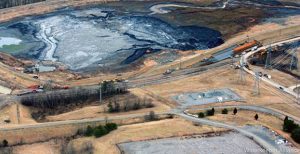Front Porch Blog
The North Carolina Senate’s coal ash bill includes cleanup plans that Duke Energy has already committed to, but it leaves too much up to DENR and a coal ash commission that has yet to be created.
This week, Republican leaders of the North Carolina Senate introduced the Coal Ash Management Act of 2014 (SB 729), a bill that they hope will bring closure to the statewide issue of coal ash pollution, eventually.
Introduced on Monday by Senate President Pro Tempore Phil Berger (R-Rockingham) and Sen. Tom Apodaca (R-Henderson), the coal ash bill would require Duke Energy to close the 33 coal ash ponds across the state within 15 years – twice as fast as Duke claims is feasible. It also calls for a commission to oversee closure plans and encourages research into other uses of coal ash.
The bill’s sponsors say it would be the most comprehensive and strict regulation of coal ash in the country — just what North Carolina needs.
Demand a coal ash plan that protects all of North Carolina’s communities
Four months ago, a massive coal ash spill at Duke’s retired Dan River plant raised the profile of coal ash pollution plaguing communities near North Carolina’s 14 coal plants. But it also spurred a regulatory and legislative response at the state level, and placed North Carolina in the center of a national debate over how to regulate the toxic waste.
Both of the bill’s primary backers have coal ash ponds in their districts and were outspoken about the need for stronger protections in the lead-up to the current legislative session. Duke Energy’s Asheville plant is in Sen. Apodaca’s district. Sen. Berger’s district includes Rockingham County, where the Dan River spill occurred.
The bill goes further than Governor Pat McCrory’s initial proposal, which fell short of the reforms needed to protect clean water and public health. But it still gives too much sway to Duke Energy and the Department of Environment and Natural Resources on how to go about closing most of the coal ash ponds in the state.
Under the bill, coal ash sites considered “high-risk” because of their proximity to major waterways, including ponds at the Dan River, Asheville, Riverbend and Sutton power plants, would have to be excavated and closed no later than 2019. Coal ash stored in ponds classified as either high- or intermediate-risk could be moved to lined landfills or recycled. Sites deemed as low-risk sites could be drained and covered, a practice known as cap-in-place, if DENR and the coal ash commission created by the bill agree it would be safe.
The bill requires DENR and the coal ash commission to develop risk classifications by August 1, 2015. But according to an analysis of the bill by N.C. Conservation Network, the bill provides no specifics guidelines on how levels of risk should be determined.
Once the level of risk is determined for the sites not included in the bill, the coal ash commission must hold a public meeting in the county where the site is located and accept comments. So residents in communities such as Belews Creek and Dukeville that live near massive coal ash ponds that both Duke Energy and state regulators know to be polluting groundwater will have to wait.
“The truth is, no coal ash pond in the state of North Carolina is a low-risk site,” attorney D.J. Gerken of the Southern Environmental Law Center told the Hendersonville, N.C., newspaper Blue Ridge Now. “It is a disaster to leave DENR the discretion to stick with the plan it has embraced for years, which is covering them over with dirt and walking away.”
When it comes to questions of accountability — an especially relevant issue considering the ongoing federal investigation into the close ties between DENR and Duke Energy in the wake of the Dan River spill — Apodaca says that’s where a proposed Coal Ash Management Commission would come in, and that the “true beauty of this bill is it won’t just be DENR making these decisions.”
Tell legislators that N.C. can’t wait for clean water. The coal ash bill should be stronger.
“That’s why we have a coal ash commission, which is made up of nine experts from different backgrounds: health, power, conservation, waste management,” Apodaca is quoted as saying in Blue Ridge Now. “We’re going to have a full mixture of folks and that’s who will be making these decisions.”
The nine members on the coal ash commission would be appointed by legislature and the governor, a prospect that should be met with skepticism based on the the industry interests represented on the state Environmental Management Commission and the Mining and Energy Commission, for example.
The commission would be tasked with approving risk classifications for coal ash ponds and their closure plans, and make recommendations on laws or regulations related to coal ash management. Under the bill, Duke Energy would be required to fund four seats on the commission as well as 25 positions at DENR.
Other seemingly positive changes to the governor’s meager proposal turned out to be arbitrary — more shiny objects than substantial improvements. For example, lawmakers say a moratorium on electricity rate increases until January 2015 would protect ratepayers from incurring costs incurred related to cleaning up coal ash. But a rate case could not realistically begin that quickly.
In short, according to the Southern Environmental Law Center, the Senate bill puts into law what Duke Energy has already committed to: cleaning up the ash at the most high-profile and dangerous sites in the state. But in its current form, the proposal leaves too much up to DENR and a coal ash commission that has yet to be created.
Take action and learn more about Appalachian Voices’ work to clean up coal ash.
PREVIOUS
NEXT
Related News

Leave a comment
Your email address will not be published. Required fields are marked *

